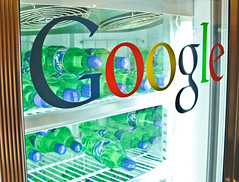
According to recent interviews, Google developers are working to make information a seamlessly integrated part of life through voice search. A user might pose a question out loud, like “What’s my next appointment?” and the answer would be displayed on Google glasses, watches or special screens on the wall. As the result, day to day life could become more intuitive. A busy cook might ask her refrigerator whether it has any milk and the fridge would respond, while automatically syncing the shopping list on her smart phone.
Voice search could make social life that much easier. Rather than feeling awkward in a conversation on an unfamiliar topic, a person could ask Google to look up the relevant facts. Rather than homogenizing the conversation, personalized search (Google already reviews Google+ posts and tailors answers to the user’s past queries) would ensure that the has both background knowledge and potentially unique ideas to contribute.
While the current mechanisms deal with voice search and the spoken word, there’s no reason why they could not begin to deal with visual memory as well. Individuals who feel comfortable with the mechanism could record important moments and then have them replayed at key moments. A job seeker could prep herself for an interview by replaying a time she did really well, and a stressed out CEO could take a break by enjoying their last vacation.
Some say Google is God. Others say Google is Satan. But if they think Google is too powerful, remember that with search engines unlike other companies, all it takes is a single click to go to another search engine.
Sergey Brin, Google Co-Founder
While verging on the creepy category, the same mechanism that brings voice search to us today could eventually be integrated with neuroimaging to automatically “suggest” memories. Carefully placed nodes on the head could detect when the amygdala is lighting up with fear and the chosen screen would automatically begin to show calming images. Such a device might be invaluable for anyone dealing with anxiety issues and could potentially save lives in other ways. The opposite end of the spectrum is obvious, the potential for abuse of such a technology is clear in ways that science fiction has made us painfully aware.
